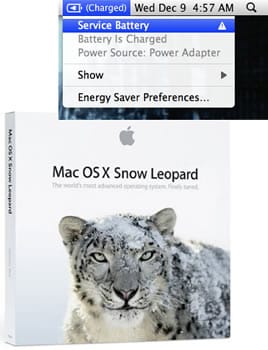I'm Not a Mac #7--Snow Leopard Ate My Macbook Battery
I'm stuck with Mac OS X Snow Leopard for awhile. That unexpected delay wouldn't suck so much if Apple's newest operating system hadn't decided to eat my Macbook battery. There's a debate among Mac users about why Snow Leopard seems to flag previously good batteries as failing, frequently popping up

This post is part of my "I'm Not a Mac" series, chronicling my controversial migration away from Apple Computer after 15 years as a Mac user. Find other entries in the "I'm Not a Mac" series archive.
When last I left off in my continuing story of exploring alternative operating systems to Mac OS X, I was trying to decide whether to adopt Linux Mint or Windows 7 as my next main OS. That was before my AT&T DSL broadband service decided yet again to tank for a weekday afternoon, making it impossible to work from my home office. My answer to that all-too-frequent occurrence was to take a hammer to the modem and sign up for CLEAR Wimax mobile broadband. (And don't you know I'm counting the days until I get a Verizon Droid and can similarly hammer my seemingly service-optional AT&T 3G iPhone.)
The Wimax service, newly arrived in Chicago, is like a breath of fresh air. Not as fast as cable modem service (some local friends get 15,000 kpbs out of Comcast), my home Wimax modem and Motorola-built USB dongle both still give me a consistent 4,000-to-6,000 kpbs--which is all AT&T's DSL ever got me, anyway. Problem is, neither CLEAR nor Motorola offer a native Linux driver for its USB dongle. So unless someone in the Linux community builds a "DIY" driver, my only migration option is Windows 7.
I'd rather not let circumstance dictate my OS choice, so for the moment, I'm in a holding pattern, waiting a bit to see if a DIY driver actually emerges. That means I'm stuck with Mac OS X Snow Leopard for awhile.
That unexpected delay wouldn't suck so much if Apple's newest operating system hadn't decided to eat my Macbook battery. There's a debate among Mac users (or see this Google search) about why Snow Leopard seems to flag previously good batteries as failing, frequently popping up the warning message atop this post, "Service Battery."
That would be fine if your battery was actually failing. However, most Mac notebook batteries are built to keep at least 80% of their original charge over 300 charging cycles. And as you might have guest, those complaining about the new warning message--including Yours Truly--have batteries with far fewer than 300 cycles, yet charging capacities far lower than 80%. (My machine's at 244 cycles and only retains an 1,821 mAh charge, about 40% of my battery's original capacity.) And oddly enough, our battery capacity only "dropped" after we installed Snow Leopard, and no amount of "calibrating" the batteries seems to help, either. Meanwhile, Snow Leopard's predecessor OS, Leopard, never showed a battery capacity problem.
Anyone who's ever suffered through a surprise, potentially mass issue with an Apple product won't be surprised that Apple has remained silent about the issue, and mainstream Mac press (who rarely disagree with Apple in these latter Steve Jobs days) haven't discussed the issue much, either. However, reports in some user forums suggest Macbook owners have gotten battery replacements in bricks-and-mortar Apple Stores by demonstrating that their machines are below 300 charges yet aren't retaining an 80% charge.
On the down-low. Silently. You know, the same way Apple begrudgingly replaces faulty iPods and iPhones after looking for any reason to deny you service (teeny pits and pings suggesting a dropped unit seem to be a common excuse.) I've had several faulty Apple products in the past 15 years and only once was I ever made to feel welcome in an Apple store when seeking service. So wish me luck for my upcoming Apple Store appointment to get my battery replaced. I'm not leaving the store without a new one.
Because that Linux USB driver may never emerge. And Windows 7 is notoriously power-hungry when running on a Macbook.




